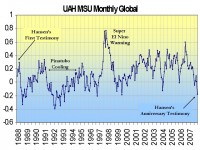By Michael Asher, Daily Tech
Alarm over sea ice loss is misplaced. Recent short-term gains in Arctic ice coverage indicate nothing about the eventual state of the Arctic. Answers to the long-term status of the region lie in the realm of a scientific branch known as paleoclimatology. What does it tell us?
The Earth is currently in the geologic epoch known as the Holocene. This began nearly 12,000 years ago when the last ice age (more precisely, the Weichsal glacial) ended. Temperatures warmed, glaciers began to retreat, and the Arctic began to melt. This began what is called an interglacial: a warmer period between glaciation. We tend to think of the poles as immutable, but geologically speaking, permanent polar ice is a rare phenomenon, comprising less than 10% of history. Icecaps form briefly between interglacials, only to melt as the next one begins—this time around will be no different.
So we know the Arctic will eventually be open water. The only question is how it will affect us? No change in sea level.
Arctic ice, which floats rather than being anchored on bedrock, doesn’t influence sea levels at all. Antarctica and Greenland do, but with one on a long-term cooling trend, and the other melting at the infinitesimal pace of 0.25% per century, there doesn’t seem to be any call for alarm. Sea level has been rising for thousands of years; the increase over the next century is expected to be less than 1/3 meter.
“Unimaginable” amounts of new resources: What’s at stake is nothing less than millions of square miles of territory, with some of the richest resources known. 90 billion barrels of oil and 1,700 trillion cubic feet of natural gas lie in the region. An ice-free Arctic also means access to other mineral resources, and access to rich new fishing grounds. Analysts have hesitated to put a figure on the total worth. But that’s not all. Just the ability to safely navigate the region is itself valuable.
The Northwest and Northeast Passages: First navigated in 1905, the famed Northwest Passage allows ships to cross between the Pacific and Atlantic oceans. Currently this requires a trip through the Panama Canal, a lengthy, expensive voyage that is barred to the largest “post-Panamax” class of ships. The permanent opening of the Northwest Passage will shave thousands of miles off each crossing, saving millions of barrels of diesel fuel annually, boosting trade and cutting shipment costs for a wide variety of imported and exported goods.
Nearly as important, the Northeast Passage is vital for parts of Northern Europe and Russia. First navigated as far back as 1879, a permanent opening will not only reduce shipping costs between Russia and Northern Europe, it will be a boon for thousands of tiny coastal communities that are currently cut off from the outside world for most of each year. Though the benefits are unmistakable, a certain segment of the population argues we shouldn’t use them. They believe using the planet’s resources is immoral, even obscene. But the fact remains that these resources are not just valuable; they’re vital. The still-growing populations of China and India are now clamoring for access to the same standard of living the western world enjoys. Granting it to them will require new sources of food, energy, and raw materials. Russia has already put its foot in the door, claiming some 460,000 square miles of new territory—an area larger than France and Germany combined. With its fleet of nuclear-powered icebreakers already surveying, Russia is brushing aside objections over its cavalier acts.
One fact remains without doubt. The warming of the Arctic will not result in our own extinction, or be anything at all but a tremendous boon to mankind and our civilization. Don’t let anyone tell you otherwise. Read more here.
By Paul Dreissen, CORE
The US Minerals Management Service recently announced that it intends to prepare a new Five Year Leasing Plan for the Outer Continental Shelf. This is a vital first step in initiating more exploration and production on OCS lands that MMS estimates could hold 86 billion barrels of oil and 420 trillion cubic feet of natural gas.
MMS has opened the process for taking public comments. I’m writing to you, in hope that you will take a few minutes form your hectic day to write a brief note or letter to MMS, underscoring your support for leasing these lands and producing more of the oil and gas that are the foundation for our economy, living standards and opportunities.
Already, a number of environmental pressure groups have mobilized their extensive financial and networking resources, to deluge MMS with comments OPPOSING any plan that opens up more OCS acreage for leasing and drilling. I’ve heard that comments to MMS are currently running at approximately 15 to 1 AGAINST opening new OCS areas - and thus in favor of continuing the unconscionable Energy War on Poor Families.
To make it easier for you to write a letter to MMS, I’ve attached a sample letter that provides some facts and ideas you can use, and that you can tailor to your own taste. Also attached are a couple of background papers by MMS and the National Ocean Industries Association (NOIA) that provide useful information about the OCS program and the laws and technologies that enable us to extract even more energy, from even deeper waters, with even greater care for the environmental values we all cherish.
You can send a detailed letter like this. But even a brief letter supporting a full analysis and expanded leasing program will help greatly. All comment letters must REACH MMS by SEPTEMBER 15, when the comment period closes.
Letters can be snail-mailed to the addresses on the sample MMS letter - or they can be submitted by going to the MMS website (http://www.mms.gov/5-year/5-YearProgramComments.htm) and using either of the following links: via the web: Public Commenting System via e-mail: 5YearRFIComments@mms.gov Thank you for tackling this, and supporting expanded US energy production, in the midst of everything else you are doing.
See sample letter here.
By Geoff Brumfiel in Nature
James Hansen, the director of NASA’s Goddard Institute for Space Studies in New York City, is well known for rattling his nation’s political establishment. This week, the climate scientist was in London, UK, to testify on behalf of activists who defaced a coal-fired power station in Kent. Geoff Brumfiel caught up with Hansen at a London hotel to find out what has got him all hot and bothered.
Why did you come to testify?
Nothing could be more central to the problem we face with global climate change. If you look at the size of the oil, gas and coal reservoirs you’ll see that the oil and gas have enough CO2 to bring us up to a dangerous level of greenhouse gases in the atmosphere. There’s a potential to solve that problem if we phase out coal. If we were to have a moratorium on coal-fired power plants within the next few years, and then phase out the existing ones between 2010 and 2030, then CO2 would peak at something between 400 and 425 parts per million. That leaves a difficult problem, but one that you can solve.
Do you think that leaders like UK Prime Minister Gordon Brown have lived up to their promises on climate change?
It depends on whether they will have a moratorium on coal-fired power. I think that the greenest leaders, like German chancellor Angela Merkel and Prime Minister Brown, are saying the right words. But if you look at their actions, emissions are continuing to increase. All of these countries and the United States are planning to build more coal-fired power plants. And if you build more coal-fired power plants, then it is not possible to achieve the goals that they say they are committed to. It’s a really simple argument and yet they won’t face up to it.
So do you think that these activists were justified in doing what they did?
The activists drawing attention to the issue seems to me as justified. You should try to do things through the democratic process, but we really are getting to an emergency situation. We can’t continue to build more coal-fired power plants that do not capture CO2 if we hope to solve the problem.
We need to get energy from somewhere. So if we’re not getting it from coal, then where?
The first thing we should do is focus on energy efficiency. The fact that utilities make more money by selling more energy is a big problem. We have to change those rules. Then there is renewable energy — in order to be able to fully exploit renewable energy, we need better electric grids. So those should be the first things, but I think that we also need to look at next-generation nuclear power.
Some have said you are hypocritical for flying all the way from the US to the UK just to testify. How do you respond?
I like to travel as little as possible, not only because it uses less CO2 but because I prefer to do science. But sometimes there are things which are sufficiently important that I think it makes sense.
What do you think the roll of the scientist should be in the broader societal debate on climate change?
I think it would be irresponsible not to speak out. There is a clear gap between what is understood by the relevant scientific community and what is known by the public, and we have to try and close that gap. If we don’t do something in the very near future, we’re going to create a situation for our children and grandchildren that is out of control.
Icecap Note:
Reality versus Hansen’s 1988 climate models. Yelllow line is holding CO2 constant at 1988 levels. Obviously not the case. Blue lines show actual temperatures. image courtesy Lucia at the Blackboard.

See larger image here
Temperatures 20 years after Hansen’s infamous congressional testimony.

See larger image here
Also Hansen has predicted 60 foot sea level rise this century the last year. See how sea levels are behaving here.


